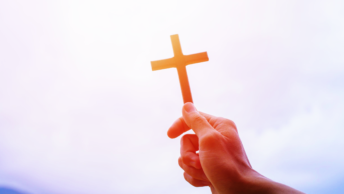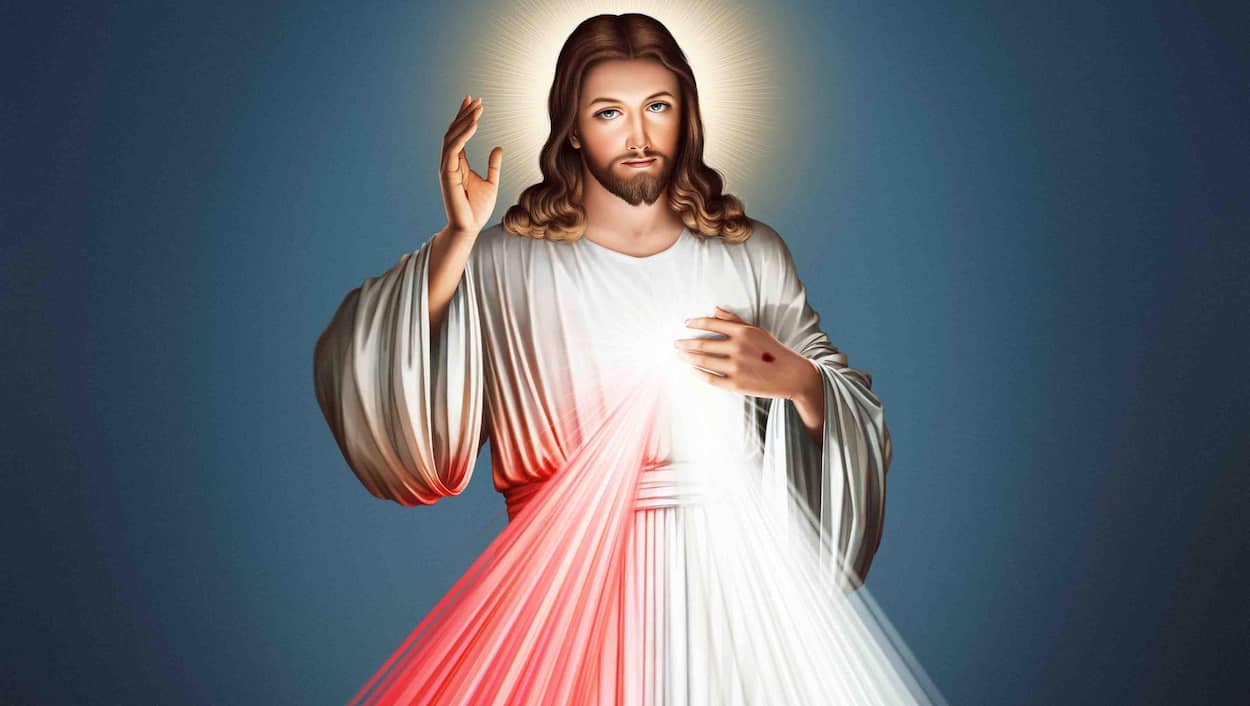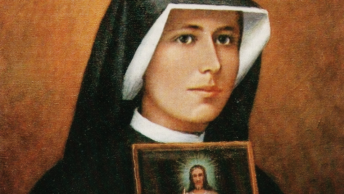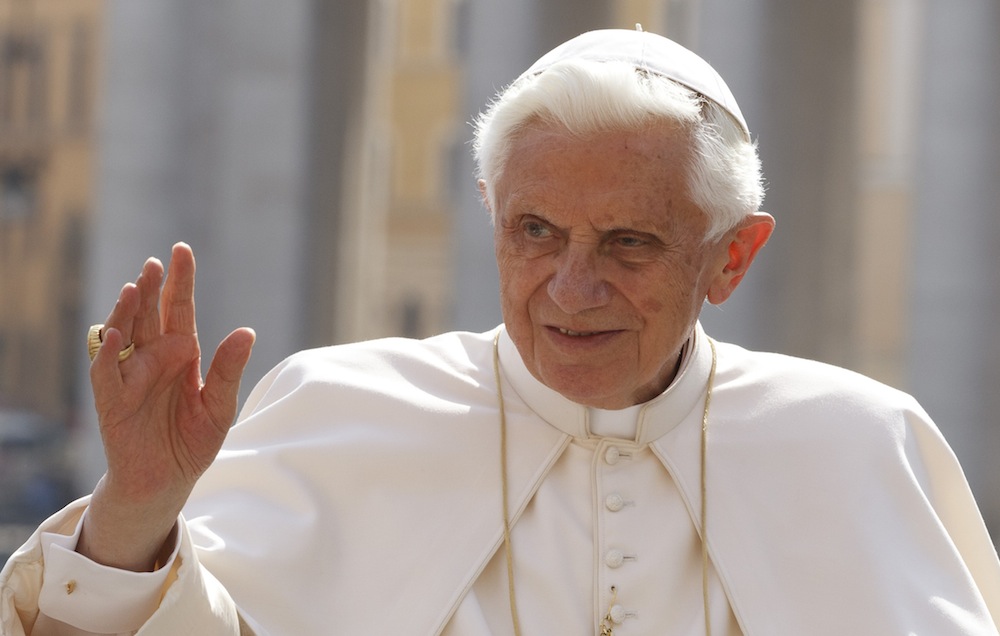You may recall that about four years ago, there was a terrible massacre at Virginia Tech University at Blacksburg, Virginia; a student with a history of mental illness shot and killed 32 students and professors on Monday April 16, 2007—the worst school shooting in American history. One of the victims was a young man named Matthew; a few years later his mother, Barbara La Porte, wrote an article called “Embraced by the Divine Mercy,” in which she said, “I would like to share with you how my devotion to Our Lord, the Divine Mercy, has helped me. Christ had laid the foundation for my spiritual healing before the tragedy. I know He continues to give me blessings, strength, and hope today.”
The day before the massacre was Sunday April 15—Divine Mercy Sunday, about which Jesus had told St. Faustina, “On that day all the divine floodgates through which graces flow are opened” (Diary, #699). Barbara had taken part in the Divine Mercy novena, and attended a Divine Mercy service that day; she especially prayed for her son Matthew, who had become somewhat lukewarm in his faith. She writes that as she left church afterwards, she was filled with incredible peace.
The following day, of course, Matthew was killed in the shootings, and a few days after his funeral, his parents received a letter from a Virginia State Trooper, which read: “I was a first responder on the scene of the tragedy that was April 16, 2007. . . . I never met Matthew in this life. I only saw him at peace, his spirit having flown away when I entered the room that day. I want to tell you I believe your son is a hero. . . . he was the only one in the room not seated at his desk. I believe he was on the move. . . . I believe your son sacrificed himself so that others in that room might live. I am not the only officer in that room to reach the same conclusion. He is with God now, and I believe he was carried by angels that morning, and now is far beyond the sun and stars. I believe you will see him again and he will be smiling when you arrive. He will tell you it’s only been a minute or so, and eternal life and [the] love that bonds us will be evermore.”
Barbara was deeply touched by the letter, and noted that “Following the massacre, news accounts referred to Matthew as a hero. We’ve since learned from a wounded student that Matt’s actions did save her life. He did die a hero. . . . I had prayed the Chaplet of Divine Mercy for Matthew the day before the shooting, on Divine Mercy Sunday. Among the promises Christ makes through St. Faustina is that ‘At the hour of death, I defend as My own glory every soul that will say this chaplet; or when others say it for a dying person, the indulgence is the same’ (Diary, #811). I know in my heart, Matthew was saved by the Divine Mercy. . . . I remember when we were at Virginia Tech for orientation. We were told the school’s mascot was a HOKIE. Since you really can’t describe a HOKIE, they said you were the HOKIE: that is to say, your spirit and enthusiasm would bond the school together. I also remember Our Lord telling me, ‘Hearts of Kindness Invalidate Evil.’ The first letter of each word spells HOKIE.” Barbara found great consolation in her grief, and more importantly, Matthew found eternal life in death, through the Divine Mercy of Jesus. Our stories may not be as dramatic, but each of us is called to live in a way that proclaims “Jesus, I trust in You.”
The Divine Mercy Chaplet is one of the greatest gifts of prayer ever given; it, along with image of Divine Mercy, the Great Novena, the Hour of Mercy at 3pm, and the special indulgence associated with Divine Mercy Sunday, are all amazing signs of Our Lord’s eagerness to forgive sinners. The greatest hour of mercy is at the hour of Jesus’ death—3pm each day—but anyone can receive His forgiveness at any time, and, as the story of Barbara’s prayers for her son Matthew indicates, offering this devotion for any of our loved ones, or for any dying person, is one of the most powerful and loving services we can ever provide. This is also a great service we provide for Jesus Himself, for He says, “Oh, how it pleases Me when even one hardened sinner repents and consoles Me with their tears of joy for My mercy being poured out upon them” (message to Jennifer, March 16, 2011). Jesus further says, “I am awaiting all of My children to implore My Mercy, and if they come to Me with true penitence in . . .virtue of My Passion, then I will immerse them in My Heart of Mercy” (message of April 4, 2011).
Many of the saints have spoken of the treasures of Divine forgiveness. For instance, St. Bridget of Sweden wrote, “If someone, at the devil’s prompting, had committed every sin against God and then, with true contrition and the intention of amendment, truly repented these sins and humbly, with burning love, asked God for mercy, there is no doubt that the kind and merciful God Himself would immediately be as ready to receive that person back into His grace with great joy and happiness as would a loving father who saw returning to him his only, dearly beloved son, now freed from a great scandal and a most shameful death.” As St. John Vianney noted, “Our sins are nothing but a grain of sand alongside the great mountain of the mercy of God.” According to St. Bernard of Clairvaux, “In Christ there are two proofs of the gentleness of His nature. He patiently awaits the return of the sinner and He gently receives the penitent. This twofold mercy abounds in the heart of the Lord Jesus—His long-suffering in waiting for the sinner and His readiness in granting pardon.”
The Lord is infinitely merciful, and He is infinitely just. St. Augustine wrote of both of these divine truths, saying, “Our Lord came first as Medicine, not as Judge. For if He had come to judge first, He would have found no one on whom He might bestow the rewards of righteousness. Since, then, He saw that all were sinners, and that no one was exempt from the sentence of death that followed sin, His mercy had to be sought first, before His judgment could be executed.” The Scripture passages we’ve heard make it clear that we don’t have to be “worthy” of God’s mercy; Jesus is eager to forgive and save us. Susanna was innocent of any crime, but the Lord intervened on her behalf through His servant Daniel. The woman caught in the act of adultery was clearly guilty. Jesus could have acquiesced in her execution by stoning as an expression of divine justice, but instead He saved her life and offered her the chance of eternal life.
Exercising mercy is always Our Lord’s preference, but the demands of justice cannot be delayed indefinitely—and there are many signs that the time of judgment upon our nation, and the world, is rapidly approaching. Jesus instructs His priests, “Inform My children that the ‘hour is near’ when there will no longer be ‘My Divine and Infinite Mercy,’ but My Divine Justice that they will have to face” (message of April 4, 2011). In other words, Our Lord’s mercy is infinite in its scope, but not unlimited in its availability; there is a deadline. This is obviously true in the case of each individual sinner: we can be forgiven up to our very last breath, but not beyond; those who do not repent of their sins before death cannot be forgiven in eternity, for the time of choosing inevitably comes to an end, and God must respect what we choose using our free will. However, this idea of a sense of urgency in accepting the Lord’s forgiveness applies in an even greater way to our society and to the entire human race: the sins of the world are so great, and the blasphemies and offenses against the Divine Majesty are so inexcusably blatant and obscene, that humanity is not only calling down justice upon itself, but provoking and even daring and compelling God to act—lest the evil one obtain complete power over humanity, including the innocent and the just.
Our Masses of Reparation are very valuable and powerful—especially when offered in unison with other believers throughout the country, as is occurring this evening—but the sins of our society are so great and pervasive that the world would be permanently corrupted, and vast numbers of souls lost forever, unless our Heavenly Father intervenes in a powerful and decisive way. We’ve all likely heard some of the many contemporary prophecies foretelling possible earthquakes, floods, and other natural disasters, along with wars, horrific acts of terrorism, economic collapse, a breakdown of society, and the imposition of martial law, followed by a religious persecution. The world may soon be overtaken by many calamities that were unthinkable even a few years ago—and which remain inconceivable to most people today. The ongoing struggle between good and evil is rapidly approaching a climax—and God will act decisively to save His faithful ones, even if it means turning the world upside down and forcing us to make radical adjustments and sacrifices. Our eternal destiny is infinitely more important to God than any considerations of earthly comfort and convenience.
While it will always be possible for sinners to repent, up to their last breaths, the same thing is not true for the world as a whole. The time of mercy is rapidly drawing to a close, and the time of judgment is nearly upon us. These words should not fill us with fear, but we do need to have a sense of urgency. If it’s been revealed to us through prayer or some other form of inspiration that we are to prepare places of refuge, there isn’t any time to waste; if our prayers are leading us to store food, water, and other emergency supplies, finishing these preparations must be a very high priority. Much more important than this, however, is the need to be spiritually prepared, and this means three things in particular. First of all, we must be in a state of grace, and if we fall into serious sin, we must quickly return to God’s grace through going to confession. As long as we’re sincerely trying to live as faithful and loving children of our Heavenly Father, we need not fear the future; indeed, remaining calm and trusting is a very valuable and important expression of our faith. Secondly, we must pray for divine guidance, so we’ll know exactly what the Lord is asking us to do in terms of any practical preparations we need to make. The Lord is always willing to help us in this way, as long as we trust Him enough to ask. Thirdly, we must pray regularly and fervently for our loved ones who are not practicing their faith, and for all the intentions Our Lady entrusted to us at Fatima and elsewhere: for true peace in the world, the salvation of the dying, the souls in purgatory, the conversion of sinners, and for an immediate end to those sins most offensive to Almighty God, especially abortion and similar outrages against His gift of life.
Mercy is available to all who sincerely seek it, but those who scorn or reject it cannot possibly escape the imminent imposition of Divine Justice. This truth should not fill us with fear, but with hope—for Barbara La Porte’s story about her powerful and successful prayers for her son Matthew, and about his heroic death, remind us that miracles of conversion, and blessings of consolation, are always possible. In all likelihood, our society will soon experience God’s justice, and much of the world, including our nation, may well become unrecognizable—but what matters is that Jesus be able to look upon each one of us and recognize us as His faithful followers. Now, more than ever, we must proclaim by our words, sacrifices, and example: “Jesus, I trust in You.”
By means of one of Our Lord’s messengers, I was told that this evening—because of the urgency of the times—I was to speak at some length on this subject of Divine Mercy, and shorten tonight’s healing service to make this possible.
I believe Jesus has asked me to emphasize these points: First, for tonight only, in the interests of saving time, it is not necessary for me to ask you the nature of your illness, nor to place my hands on the particular area where you suffer. Second, as always, your faith, trust, and belief in His power and willingness to heal are essential to obtain a miracle, along with confession and a commitment to praying the Rosary. Third, while only Catholics can receive the Sacrament of Anointing, God’s children of all faiths can obtain a blessing—but they too must show Him their faith, trust, and belief in His power to heal.








